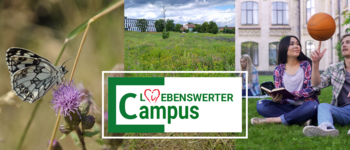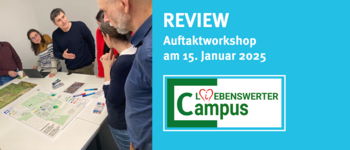L(i)ebenswerter Campus
The ‘L(i)ebenswerter Campus’ transformation experiment aims to take into account the needs of different animal and plant species as well as the different interests and preferences of various human user groups when designing and maintaining the green spaces on the Hubland campus.
Specifically, additional habitats (microhabitats) are to be created for insects, birds and reptiles, and the existing mowing concept is to be converted into a more comprehensive maintenance concept. Both measures will be discussed in a participatory process with representatives from all status groups.
The future use of the areas, e.g. for planned construction measures, will be fully taken into account in order to avoid potential conflicts of interest between species conservation and the expansion of the university. In the concrete planning and evaluation of the measures, the cooperative and collegial collaboration with the university management, the area management, the technical operation and the Mainfränkische Werkstätten plays a central role in order to ensure not only the ecological value of the measures but also their feasibility and to harmonise them with the availability of human and financial resources.
The result of the participatory process should be a maintenance concept that can be adapted to future planning and priorities in land management and takes equal account of ecological, social and economic aspects. The effects of the implemented measures on biodiversity will be scientifically monitored by the ecological chairs at the Biocentre and other university groups. The transformation experiment involves a number of practice partners and experts and aims to connect to the existing transformation project „Socio-ecological transformation of the Campus“ (Project REKLINEU, JMU-sub-project 10) anbinden. The transformation experiment will be supported by knowledge and experience gathered as part of the ‘Lebendiger Campus‘ initiative and by networking with other university initiatives.
At the end of the transformation experiment, not only the habitat quality for animals and plants, but also the quality of stay for employees, students and visitors to the University of Würzburg should be improved.
Kick-off workshop on January 15, 2025
You can find all the information about the successful launch in the review.









